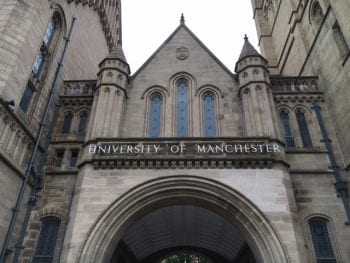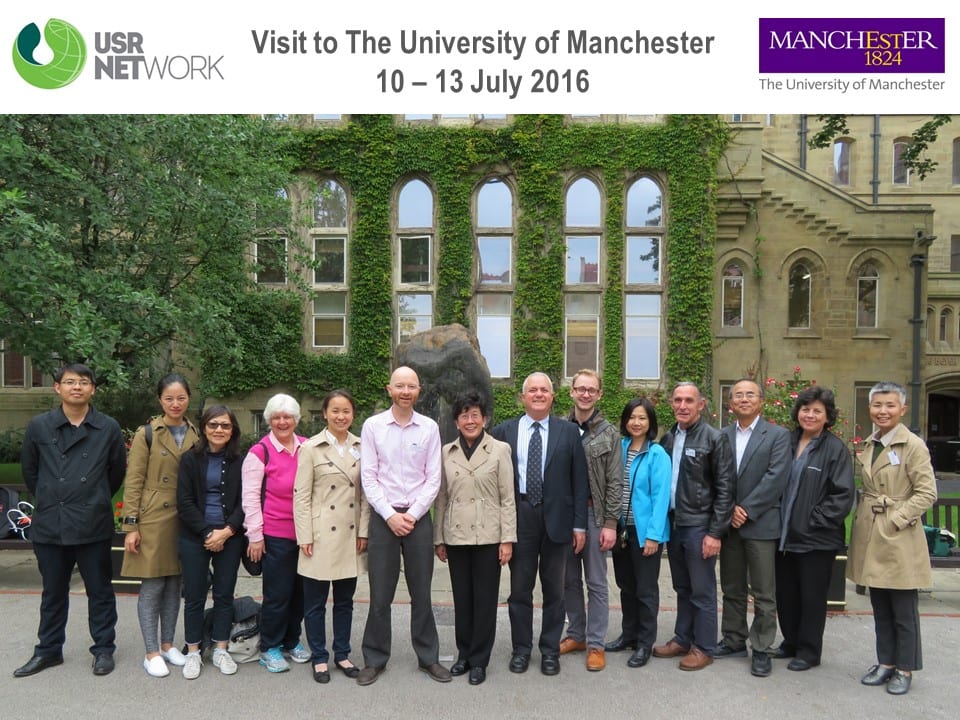Matthew Bakko, Research Manager and Instructional Specialist, visited the University of Manchester in July 2016 as part of the Gephardt Institute for Civic and Community Engagement’s membership in the University Social Responsibility Network.
Washington University in St. Louis is a founding member of the network, which is dedicated towards collaboration among universities towards fostering university social responsibility and community engagement through research, student and faculty exchanges, and resource sharing. The purpose of the Manchester visit was to explore how the university approaches its community engagement work so as to better inform member university’s engagement in their own communities.

Much like St. Louis, Manchester is a historically industrialized city (considered to be the first one in the world) with increasing levels of human, cultural, and economic diversity. But even more comparatively glaring, it is also a city with entrenched geographic divides, particularly along socioeconomic lines. Much like moves by Washington University to renew its focus “in St. Louis,” the University of Manchester takes its namesake seriously. Considered a top-tier research university in the UK (this is where Rutherford split the atom, and more recently, where graphene was invented), the University places paramount value on leveraging its resources and relationships towards engaging and bettering the local Manchester community:
- Developing human, social, and economic capital is central to how the University practices social responsibility. The local community’s increasing unemployment led to the creation of “The Works,” a university-run job training and placement center that serves residents who live close to the university. Unemployed or underemployed local residents receive skills training or apprenticeships, and benefit from job placement pipelines into non-academic university jobs or positions with other local employers that are encouraged by the university to hire through the center. Thousands of local residents have been employed in the center’s first five years.
- Similar to the Gephardt Institute’s mission to cultivate a civic-minded university community, Manchester is dedicated to producing “social responsible graduates.” Through the “Ethical Grand Challenges” initiative, every undergraduate student engages in dialogue, curriculum, and workshops that build knowledge, skills, and attitudes for tackling key social issues such as environmental sustainability, social justice, and workplace ethics. Faculty and staff are also supported in developing a socially responsible ethic through organizing their inclusion in local school leadership and through providing every university employee with mandatory learning regarding everyday environmental sustainability.
- The university’s research is also pivoting towards local, socially responsible impact, by re-orienting faculty member’s research interests to issues germane to Manchester, particularly around issues of inequality. The Manchester Institute for Collaborative Research on Ageing trains local older adults as co-researchers who then interview other older adults about fostering an age-friendly Manchester. The DevoManc Hub researches the increasing devolution of government in Manchester, offering policy analysis and recommendations across a range of social and political issues. The Open World Research Initiative researches the rich linguistic diversity of Manchester towards understanding issues of migration and community development.
The University of Manchester’s commitment to social responsibility is in its very bones. Social Responsibility serves as one of three overarching goals for the university, along with research and teaching. An Associate Vice-President for Social Responsibility is charged with overall academic integration of social responsibility throughout the university, and each college has a Vice Dean dedicated to ensuring social responsibility achieves buy-in from faculty and intersects with the university’s other two goals. A small central office of social responsibility provides capacity-building support to the university, but the charge to do the work is shared: social responsibility is seen as everyone’s responsibility. To make their work cohesive and strategic, the university produces a university-wide community social engagement strategic plan each year that guides all members towards mutual benefit work with the community.

To quote a high-level university administrator, “critically-engaged universities need to re-orient their priorities, policies, work, research, and initiatives.” A deeply embedded goal and practice of social responsibility and community engagement forces the university to hold a mirror up to itself to set an example for the citizenry it attempts to cultivate. As universities, including Washington University in St. Louis and University of Manchester, become more “in” and “of” their local communities, the potential for aligning institutional strategy with local opportunities, community vision, and reciprocal university-community benefit are vast.
Where does the university end and the community begin? The line is getting blurrier, and that can be a good thing.